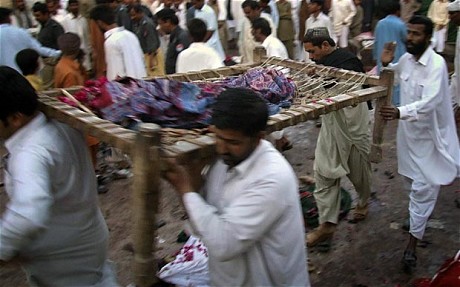
Pakistani Taliban Widen the Civil War — Against Fellow Deobandis
Publication: Terrorism Monitor Volume: 9 Issue: 15
By:

Two recent suicide attacks in as many days on Maulana Fazlur Rehman, the amir of the Jamiat Ulema-e-Islam Fazlur Rehman (JUI-F), show that the Pakistani Taliban are further widening their sectarian war on competing interpretations of political Islam (Dawn [Karachi] April 1). [1] Although the maulana himself survived unhurt, dozens of JUI-F workers died and many more were injured.
Pakistan’s Deobandi Taliban came on the scene by waging a war on religious minorities including the Ahmadis. In the 1980s, they started a new sectarian war against the Shi’a Muslims, who make up the second biggest Muslim sect in Pakistan after the Barelvi (i.e. Sufi) Muslims. In the late 2000s, they widened their aim to include the Barelvis. The back-to-back attacks on Fazlur Rehman, the leader of a Deobandi Islamist party which has the largest voting bank among the Islamist parties, show that the Pakistani Taliban cannot tolerate less extremist Deobandi parties. They also show that a bloodier civil war is still looming large over Pakistan.
Ironically, no Taliban group has so far claimed the responsibility for the attacks (The News [Islamabad], April 4). The apparent reason is that several Taliban groups still have respect for the JUI-F. Public ownership of the suicide attacks is bound to divide the Taliban movement. In fact, the Gul Bahadur faction of the Tehrik-e-Taliban Pakistan (TTP) announced it would investigate the attacks and punish the culprits, implicitly accepting that the attacks had been carried out by an extremist group (Dawn, April 5). Equally important is the fact that the JUI-F has half-heartedly accused the imperialist forces including the U.S. (Dawn, March 31; The News, April 4). The reason behind this is the JUI-F does not want to be seen as anti-Taliban. A large number of JUI-F members are now closer at heart with the Taliban than with their own party. Accusing the Taliban of suicide attacks publicly is likely to create rifts within the party.
The JUI has a history of waging struggles against British imperialism and military dictatorships in Pakistan. The JUI-F was a component of the Benazir Bhutto-led Movement for the Restoration of Democracy (MRD) in the 1980s. The JUI-F also opposed the anti-Soviet Afghan jihad before the rise of the Taliban in Afghanistan. The JUI-F became the most popular Islamist party because of its pro-democracy policies and has been a breeding ground for extremists. The militant founder of Sipah-e-Sahaba Pakistan (SSP), Maulana Haq Nawaz Jhangvi, was a local leader of the JUI-F in Jhang before he founded his own extremist group. Many Taliban in North Waziristan and South Waziristan are former members of the JUI-F or its student wing. Baitullah Mahsud, Maulvi Nazir, Hafiz Gul Bahadur, and Mufti Waliur Rehman were all local JUI-F leaders before they became Taliban (Dawn, November 15, 2009). To stem the flow of members to more militant organizations the party began to move closer to extremist groups in the 1990s. While Maulana Fazlur Rehman remains a pragmatist Islamist politician and tries to play a double game, as the Taliban grow in influence on the Pakistani jihadi scene they are becoming less and less tolerant of such politics.
The Taliban groups which have spun out of the ISI control particularly oppose the JUI-F’s politics. They consider the party’s cooperation with the General Musharraf-led military regime an unforgivable sin. It was in April 2009 when the Punjabi Taliban (a.k.a. the Asian Tigers), publicly issued a veiled threat to Maulana Fazlur Rehman (see Terrorism Monitor, May 20, 2010). The statement was prepared by the Punjabi Taliban and read by their captive, former Inter-Services Intelligence (ISI) operative Khalid Khawaja, just before Khawaja was killed in April 2010. The message named Maulana Fazlur Rehman as a collaborator of the Pakistani military regime which had been handing over Taliban captives to the Americans (Asia Times, April 24, 2010). The other crimes included supporting military action against the Red Mosque imams in 2007. [2] After the release of the video, it was a forgone conclusion that Fazlur Rehman was on the hit list of the Punjabi Taliban. It is a safe bet to believe that the Punjabi Taliban are likely to carry out suicide attacks on other Deobandi clerics such as Hanif Jallundari and Taqi Usmani, whom they accuse of collaborating with the Pakistani army.
With the suicide attacks on Maulana Fazlur Rehman, the stage is set for a bloodier civil war to begin in Pakistan. Taliban groups are already at war with other sects and state institutions, particularly the Barelvis, the Shi’a and the Pakistani army. The only sect the Taliban have not pulled into the fray is Lashkar-e-Taiba/Jama’at-ud-Da’wah (LeT/JuD), which, interestingly, is the only sect or jihadist group with more firepower and manpower than the Pakistani Taliban.
The pattern in which the civil war in Pakistan has been spreading so far shows that it is only a matter of time before the Deobandi extremists of the TTP and the LeT/JuD are at each other’s throats, which would be the bloodiest phase of Pakistan’s civil war yet.
Notes:
1. At present there are two rival wings of the Jamiat Ulema-e-Islam, that of Maulana Fazlur Rehman (JUI-F) and that of Maulana Sami-ul Haq (JUI-S). Both are part of the Muttahida Majlis-e-Amal (MMA) coalition. A third faction led by Maulana Ajmal Qadri has an armed wing in Kashmir known as Jamiat-ul-Mujahideen al-Aalmi but is not part of the MMA coalition.
2. The video in Urdu is available on https://www.youtube.com/watch?v=YQ8NLDqyz_Y&feature=related and
https://www.youtube.com/watch?v=te5U8mBLlTU&feature=related.





